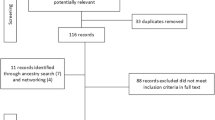Abstract
Theoretical models for patient-physician communication in clinical practice are frequently described in the literature. Respecting patient autonomy is an ethical problem the physician faces in a medical emergency situation. No theoretical physician-patient model seems to be ideal for solving the communication problem in clinical practice. Theoretical models can at best give guidance to behavior and judgement in emergency situations. In this article the premises of autonomous treatment decisions are discussed. Based on a case-report we discuss different genuine efforts the physician can do to uncover treatment refusal and respect patient autonomy in an emergency situation. Autonomy requires competence and in emergency medicine time does not allow intimate exploration of patient competence and reasons for treatment refusal. We find that the physician must base her decision on a firm theoretical base combined with a practical and realistic view of the patient's situation on a case to case basis.
Similar content being viewed by others
References
Alvik, A. and Sønderland, K.: 1993, Taushetsplikten–behov for lovhjemlede unntak? Oslo, Norway: Helsedirektoratet.
Beauchamp, T.L.: 1986, ‘Uncertain diagnosis and the uncooperative patient’, in: K.V. Iserson, A.B. Sanders, D.R. Mathieu and A.E. Buchanan (eds.), Ethics in Emergency Medicine. Baltimore, London: Williams and Wilkins, pp. 65–69.
Beauchamp, T.L. and J.F. Childress: 1994, Principles of Biomedical Ethics, 4th edn. New York: Oxford University Press, pp. 120–188.
Brock, D.W. and S.A. Wartman: 1990, ‘When competent patients make irrational choices’, The New England Journal of Medicine 322(22), 1595–1599.
Brock, D.W.: 1986, ‘Informed participation in decisions’, in: K.V. Iserson, A.B. Sanders, D.R. Mathieu and A.E. Buchanan (eds.), Ethics in Emergency Medicine. Baltimore, London: Williams and Wilkins, pp. 47–52.
Brody, H.: 1987, ‘The physician–patient relationship: Models and criticisms’, Theoretical Medicine 8, 205–220.
Buchanan, A.E.: 1986, ‘The question of competence’, in: K.V. Iserson, A.B. Sanders, D.R. Mathieu and A.E. Buchanan (eds.), Ethics in Emergency Medicine. Baltimore, London: Williams and Wilkins, pp. 52–56.
Cassel, C.K. and N.R. Zweibel: 1987, ‘Attitudes regarding life extending medical care among the elderly and their children’, The Gerontologist 27 (Special issue), 229(A).
Cohen, J.S. et al.: 1994, ‘Attitudes toward assisted suicide and euthanasia among physicians in Washington State’, The New England Journal of Medicine 331, 89–94.
Emanuel, E.J. and L.L. Emanuel: 1992, ‘Four models of the physician–patient relationship’, The Journal of the American Medical Association 267(16), 2221–2226.
Emanuel, L.L. et al.: 1994, ‘Advance directives: stability of patients' treatment choices’, The Archives of Internal Medicine 154, 209–217.
Hare, J. et al.: 1992, ‘Agreement between patients and their self selected surrogates on difficult medical decisions’, The Archives of Internal Medicine 152, 1049–1054.
Janofsky, J.S. et al.: 1992, ‘The Hopkins Competency Assessment test: A brief method for evaluating patients' capacity to give informed consent’, Hospital and Community Psychiatry 43(2), 132–136.
Kellogg, F.R. et al.: 1992, ‘Life–sustaining interventions in frail elderly persons’, The Archives of Internal Medicine 152, 2317–2320.
Layson, R. et al.: 1994, ‘Discussions about the use of lifesustaining treatments: A literature review of physicians' and patients' attitudes and practices’, The Journal of Clinical Ethics 5(3), 195–203.
Lee, M.L. and L. Ganzini: 1992, ‘Depression in the elderly: Effect on patients' attitudes toward life–sustaining therapy’, The Journal of the American Geriatrics Society 40, 983–988.
Llewellyn–Thomas, H.A. et al.: 1993, ‘Do patients' evaluations of a future health state change when they actually enter that state?’, Medical Care 31, 1002–1012.
Mazur, D.J. and J.F. Merz: 1994, ‘How age, outcome severity, and scale influence general medicine clinic patients' interpretations of verbal probability terms’, The Journal of General Internal Medicine 9, 268–271.
Pfeiffer, E.: 1975, ‘A short portable mental status questionnaire for the assessment of organic brain deficit in elderly patients’, The Journal of the American Geriatrics Society 23(10), 433–441.
Quill, T.E. and H. Brody: 1996, ‘Physician recommendation and patient autonomy: Finding a balance between physician power and patient choice’, American College of Physicians 125(9), 763–769.
Redelmeier, D. et al.: 1993, ‘Understanding patients' decisions: cognitive and emotional perspectives’, The Journal of the American Medical Association 270, 72–76.
Rosser, R. and P. Kind: 1978, ‘A scale of valuations of states of illness: is there a social consensus?’, The Internal Journal of Epidemiology 7(4), 347–358.
Shmerling, R.H. et al.: 1988, ‘Discussing cardiopulmonary resuscitation: A study of elderly outpatients’, The Journal of General Internal Medicine 3, 317–321.
Silverstein, M.D. et al.: 1991, ‘Amyotrophic lateral sclerosis and life–sustaining therapy: Patients' desires for information, participation in decision making, and life–sustaining therapy’, The Mayo Clinic Proceedings 66, 906–913.
Sorum, P.C.: 1995, ‘Deciding about cardiopulmonary resuscitation’, The Archives of Internal Medicine 155, 513–521.
Stanley, B. et al.: 1988, ‘The functional competency of elderly at risk’, The Gerontologist 28(Suppl.), 53–58.
Suhl, J. et al.: 1994, ‘Myth of substituted judgement’, The Archives of Internal Medicine 154, 90–96.
Tversky, A. and D. Kahneman: 1981, ‘The framing of decisions and psychology of choice’, Science 211, 453–458.
Wear, A.N. and D. Brahams: 1991, ‘To treat or not to treat: the legal, ethical and therapeutic implications of treatment refusal’, The Journal of Clinical Ethics 17, 131–135.
Author information
Authors and Affiliations
Corresponding author
Rights and permissions
About this article
Cite this article
Naess, AC., Foerde, R. & Steen, P.A. Patient autonomy in emergency medicine. Med Health Care Philos 4, 71–77 (2001). https://doi.org/10.1023/A:1009982710625
Issue Date:
DOI: https://doi.org/10.1023/A:1009982710625




